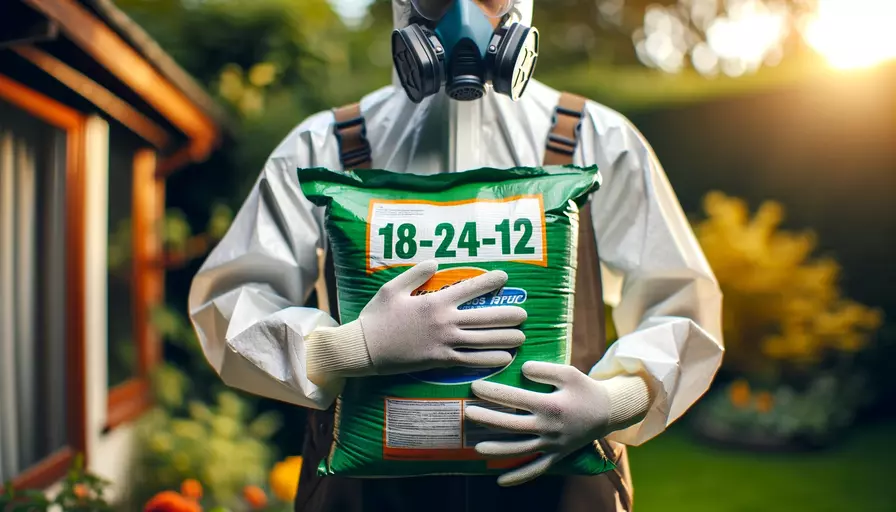18-24-12 Fertilizer: A Guide for Healthy Plant Growth

Using the right Fertilizer is crucial for growing healthy plants. This comprehensive guide will explore the benefits and application of 18-24-12 Fertilizers. Whether you’re an experienced gardener or just starting, this article will provide valuable insights in easy-to-understand language. Let’s dive in.
Understanding 18-24-12 Fertilizer:
Understanding the composition of fertilizers is essential for helping your plants thrive. One such Fertilizer that plays a crucial role in plant growth and development is the 18-24-12 Fertilizer. This type of plant food contains a specific ratio of nutrients vital for your plants’ well-being.
The numbers in the fertilizer name, 18-24-12, represent the percentage of three essential nutrients it contains: nitrogen (N), phosphorus (P), and potassium (K). Nitrogen makes up 18% of the Fertilizer, phosphorus 24%, and potassium 12%.
Nitrogen is an essential nutrient promoting healthy plant leaf and stem growth. Nitrogen provides plants with their vibrant green color and supports the development of robust and lush foliage. Without sufficient nitrogen, plants can become pale, weak, and stunted.
Phosphorus, which makes up 24% of the 18-24-12 Fertilizer, is essential for root development. It helps plants establish strong and healthy root systems for nutrient uptake and water absorption. Phosphorus also plays a vital role in flower and fruit production, contributing to the overall reproductive health of the plant.
At 12% in 18-24-12 Fertilizers, potassium enhances plants’ overall vigor. It involves various plant processes, including photosynthesis, enzyme activation, and water regulation. Potassium helps plants withstand stress, resist diseases, and develop better resistance to harsh environmental conditions.
By understanding the role of each nutrient in 18-24-12 fertilizers, you can ensure that your plants receive the right balance of nutrition for their optimal growth and development. Different plants have different nutrient requirements, so it’s essential to consider their specific needs when choosing the right Fertilizer.
With the proper nutrients, including nitrogen for leaf and stem growth, phosphorus for root development, and potassium for overall plant vigor, your plants will have a solid foundation for healthy growth and thrive in their environment.
Benefits of 18-24-12 Fertilizer
Using 18-24-12 Fertilizers benefits your plant’s overall health and vitality. Let’s take a closer look at unpacking these advantages in more detail:
Balanced Nutrient Ratio
One significant benefit of 18-24-12 Fertilizer is its balanced nutrient ratio. With 18% nitrogen, 24% phosphorus, and 12% potassium, this Fertilizer ensures that your plants receive a well-rounded supply of essential nutrients. This balanced ratio promotes optimal growth by giving plants the necessary elements to thrive.
Strong Root Development
The 24% phosphorus component in 18-24-12 Fertilizer supports the development of robust root systems. Robust root development is vital for plants, enhancing nutrient uptake and water absorption. With more robust roots, plants can access essential resources more efficiently, leading to healthier growth and improved overall plant performance.
Enhanced Disease Resistance
Another benefit of using 18-24-12 Fertilizer is its ability to help plants resist diseases and stress. The combination of nutrients, particularly potassium, strengthens the plant’s immune system, making it more resilient to various diseases and environmental challenges. By providing plants with the necessary nutrients to build their defense mechanisms, this Fertilizer supports their ability to fight off infections and maintain their well-being.
Improved Resilience
In addition to disease resistance, 18-24-12 Fertilizers enhance fertilizer plants’ overall resilience. The nutrients they provide help plants withstand stress caused by factors such as extreme temperatures, drought, or nutrient deficiencies. By fortifying plants with the necessary elements, this Fertilizer empowers them to cope better with adverse conditions and recover more quickly from any challenges they may face.
Using 18-24-12 Fertilizers ensures that your plants receive the right balance of nutrients to promote optimal growth. This balanced approach results in strong root development, improved nutrient uptake, and enhanced water absorption. Additionally, the Fertilizer’s contribution to disease resistance and overall resilience helps plants maintain their health and well-being even under challenging circumstances. Incorporating this Fertilizer into your plant care routine can significantly benefit your plants’ overall vitality and success.
How to Use 18-24-12 Fertilizer
Using 18-24-12 Fertilizers is a straightforward process that can help you give your plants the essential nutrients they need. Follow these simple steps to ensure effective application:
Read the Instructions
Carefully read the 18-24-12 Fertilizer’s packaging instructions. The instructions will provide valuable information regarding the recommended application rate and any specific guidelines for usage.
Determine the Application Rate
Once familiar with the instructions, determine the appropriate application rate for your plants. The packaging will typically guide the Fertilizer used per square foot or plant. Following these recommendations is crucial to avoid over- or underfeeding your plants.
Apply Evenly Around the Base:
- When applying the 18-24-12 fertilizer, distribute it evenly around the base of the plants.
- Use a scoop or a spreader to ensure consistent coverage.
- Prevent the fertilizer from directly contacting the plant’s stems or leaves, which could cause damage.
Water Thoroughly
After applying the Fertilizer, water your plants thoroughly. This step helps the nutrients in the Fertilizer penetrate the soil and reach the plants’ roots. Adequate watering also helps prevent potential fertilizer burn and ensures that the plants absorb the Fertilizer effectively.
Nutrients
It is essential to consider your plants’ specific needs and the environmental conditions they are exposed to. Factors such as plant type, growth stage, and soil composition can influence the optimal timing and frequency of fertilizer application. Always refer to the instructions provided for the Fertilizer and adjust accordingly to meet your plants’ requirements.
By following these simple guidelines, you can ensure that your plants receive the appropriate amount of 18-24-12 Fertilizer for their optimal growth and development. Proper application and watering are crucial to maximizing this Fertilizer’s benefits and promoting your plants’ health and vitality.
Factors to Consider
While 18-24-12 Fertilizer offers numerous advantages, it’s essential to consider a few factors before using it. Doing so can ensure you provide the best care for your plants and avoid any potential adverse effects. Let’s explore these factors in detail:
Specific Needs of Your Plants
Different plant species have varying nutrient requirements. Before applying the 18-24-12 Fertilizer, evaluate the specific needs of your plants. Some plants may thrive with the balanced nutrient ratio provided by this Fertilizer. In contrast, others may require different ratios to meet their specific growth and development needs. Research your plants’ nutritional requirements to determine if 18-24-12 Fertilizers are suitable or if an alternative fertilizer may be more appropriate.
Soil pH
The pH level of your soil plays a crucial role in nutrient availability and uptake. Before applying the 18-24-12 Fertilizer, test the pH of your soil. Some plants prefer acidic soil, while others thrive in alkaline or neutral conditions. If the pH level of your soil is not within the optimal range for your plants, consider adjusting it accordingly. You can use soil amendments or fertilizers designed explicitly for correcting pH levels to ensure that your plants can effectively absorb the nutrients provided by the 18-24-12 Fertilizer.
Recommended Dosage and Application Frequency
To avoid over-fertilization, following the recommended dosage and application frequency provided on the packaging of the 18-24-12 Fertilizer is crucial. Over-fertilization can lead to nutrient imbalances, chemical burns, or even plant damage. Adhering to the instructions will help you give your plants the appropriate amount of nutrients without overwhelming them. It is important to note that underfertilizing is generally preferable to overfertilizing.
Environmental Factors
Consider the environmental conditions your plants are exposed to, such as temperature, humidity, and sunlight. These factors can influence their nutrient requirements. For example, plants in hot, dry climates may require more frequent and lighter applications of Fertilizer to prevent nutrient leaching. Understanding your plants’ unique needs in the environment will help you make informed decisions about the timing and frequency of fertilizer application. By considering these factors, you can ensure that the use of 18-24-12 fertilizers is tailored to meet the specific needs of your plants and the conditions in which they grow. This thoughtful approach will help you provide optimal care for your plants, promoting their health and vitality while avoiding any potential adverse effects of improper fertilizer usage.
Precautions and Safety Measures
When handling fertilizers, including 18-24-12 Fertilizers, it is crucial to prioritize safety to ensure your well-being and plants’ health. Here are some important precautions and safety measures to consider:
Wear Protective Gear
Always wear gloves and protective clothing, such as long sleeves and pants, when handling 18-24-12 Fertilizer. This will help minimize direct contact with your skin and reduce the risk of irritation or potential allergic reactions. Also, consider wearing safety goggles or glasses to protect your eyes from accidental splashes or dust.
Keep Away from Children and Pets
Fertilizers, including 18-24-12, should be stored in a secure location out of reach of children and pets. The packaging may contain tiny particles or chemicals that can be harmful if ingested. Keep the Fertilizer in a locked cabinet or high shelf to prevent accidental access.
Store in a Cool, Dry Place
Proper storage is essential to maintaining the effectiveness and safety of 18-24-12 Fertilizers. Store the fertilizer in a cool, dry location, away from direct sunlight. Exposure to excessive heat and moisture can degrade the fertilizer and reduce its efficacy.
Read and Follow the Instructions
Before using the Fertilizer, carefully read and follow the instructions on the packaging. Different fertilizers may have specific guidelines for application rates, dilution, and safety precautions. These instructions will help you achieve the desired results while minimizing potential risks.
Seek Medical Attention if Needed
In case of accidental ingestion, contact with the eyes, or prolonged skin contact, seek immediate medical attention. It is essential to act swiftly to minimize any potential harm. Bring the Fertilizer’s packaging or label to provide information to healthcare professionals.
Remember, safety should always be a priority when working with any fertilizer. By following these precautions and safety measures, you can ensure a safe and successful experience while using 18-24-12 Fertilizer.
Conclusion
In case of accidental ingestion, contact with the eyes, or prolonged skin contact, seek immediate medical attention. It is essential to act swiftly to minimize any potential harm. Bring the Fertilizer’s packaging or label to provide information to healthcare professionals. Remember, safety should always be a priority when working with any fertilizer. By following these precautions and safety measures, you can ensure a safe and successful experience while using 18-24-12 Fertilizer.
Frequently Asked Questions
What do the three numbers (18-24-12) in 18-24-12 Fertilizer represent?
The numbers in 18-24-12 Fertilizer represent the nutrient ratios of nitrogen, phosphorus, and potassium (N-P-K) contained in the Fertilizer. The Fertilizer contains 18% nitrogen, 24% phosphorus, and 12% potassium, which are essential for plant growth and development.
Is 18-24-12 fertilizer suitable for all types of plants?
While 18-24-12 Fertilizers provide a balanced nutrient ratio that benefits many plants, it’s essential to consider your plants’ specific needs. Some plants may require different nutrient ratios or have specific nutrient preferences. Research your plants’ nutritional requirements to determine if 18-24-12 Fertilizers are suitable or if alternative fertilizers may be more appropriate.
Can I use 18-24-12 fertilizer on my indoor plants?
Yes, 18-24-12 Fertilizers can be used on indoor plants. However, it is essential to consider the specific needs of your indoor plants, such as light requirements, potting soil composition, and watering habits. Adjust the application rate and frequency according to the instructions provided and the specific needs of your indoor plants.
How often should I apply 18-24-12 fertilizer to my plants?
The frequency of application will depend on various factors, including the specific plants, their growth stage, and environmental conditions. Generally, 18-24-12 FertilizersFertilizer should be applied every 4-6 weeks during the growing season. However, always follow the instructions on the packaging for specific guidelines regarding application frequency.
Can I mix 18-24-12 fertilizer with other fertilizers?
You can mix 18-24-12 Fertilizer with other fertilizers, but caution is essential. Mixing fertilizers can alter nutrient ratios, potentially leading to imbalances or nutrient deficiencies. If you mix fertilizers, ensure their nutrient ratios complement each other and follow the recommended application rates to avoid over-fertilization.
Will using 18-24-12 fertilizer harm my plants if I accidentally apply too much?
Over-fertilization can harm plants, causing nutrient imbalances and potential damage. Following the recommended dosage and application frequency provided on the packaging is crucial. If you accidentally apply too much Fertilizer, flush the soil with water to help leach out excess nutrients. Monitor your plants for any nutrient burn or stress signs and adjust future applications accordingly.
Can I consider any alternatives to 18-24-12 fertilizer for my plants?
Yes, alternative fertilizers better suit your plants’ specific needs. Different plants may require specific nutrient ratios or specialized fertilizers. Research and consider organic fertilizers, slow-release fertilizers, or specialized formulations tailored to your plant’s needs. Always choose a fertilizer that aligns with your plants’ nutritional requirements for optimal growth and health.






